
Director: Bong Joon Ho
Wrtier: Bong Joon Ho, Kwang-rim Kim, Sung-bo Shim,
Stars: Kang-ho Song Kim Sang-kyung Roe-ha Kim
Summary: In a small Korean province in 1986, two detectives struggle with the case of multiple young women being found raped and murdered by an unknown culprit.
The movie ‘Memories of Murder’ is directed by the ingenious South Korean filmmaker, Bong Joon-ho and I believe it to be his best work yet. You ask why? Because it is the most honest movie that this director has ever made. I will postpone my breakdown of what I mean exactly by this to a separate post where I intend to compare the movies ‘Parasite’ and ‘Memories of Murder’ together. Let’s look at the movie ‘Memories of Murder’. The plot is based on the real events of the first case of serial murders in South Korea’s contemporary history which occurred between 1986 and 1991 in Hwaseong in the province of Gyeonggi-do. Song Kang-ho and Kim Sang-kyung portray the roles of two of the detectives trying to solve these crimes, Detective Park and Detective Seo, respectively.
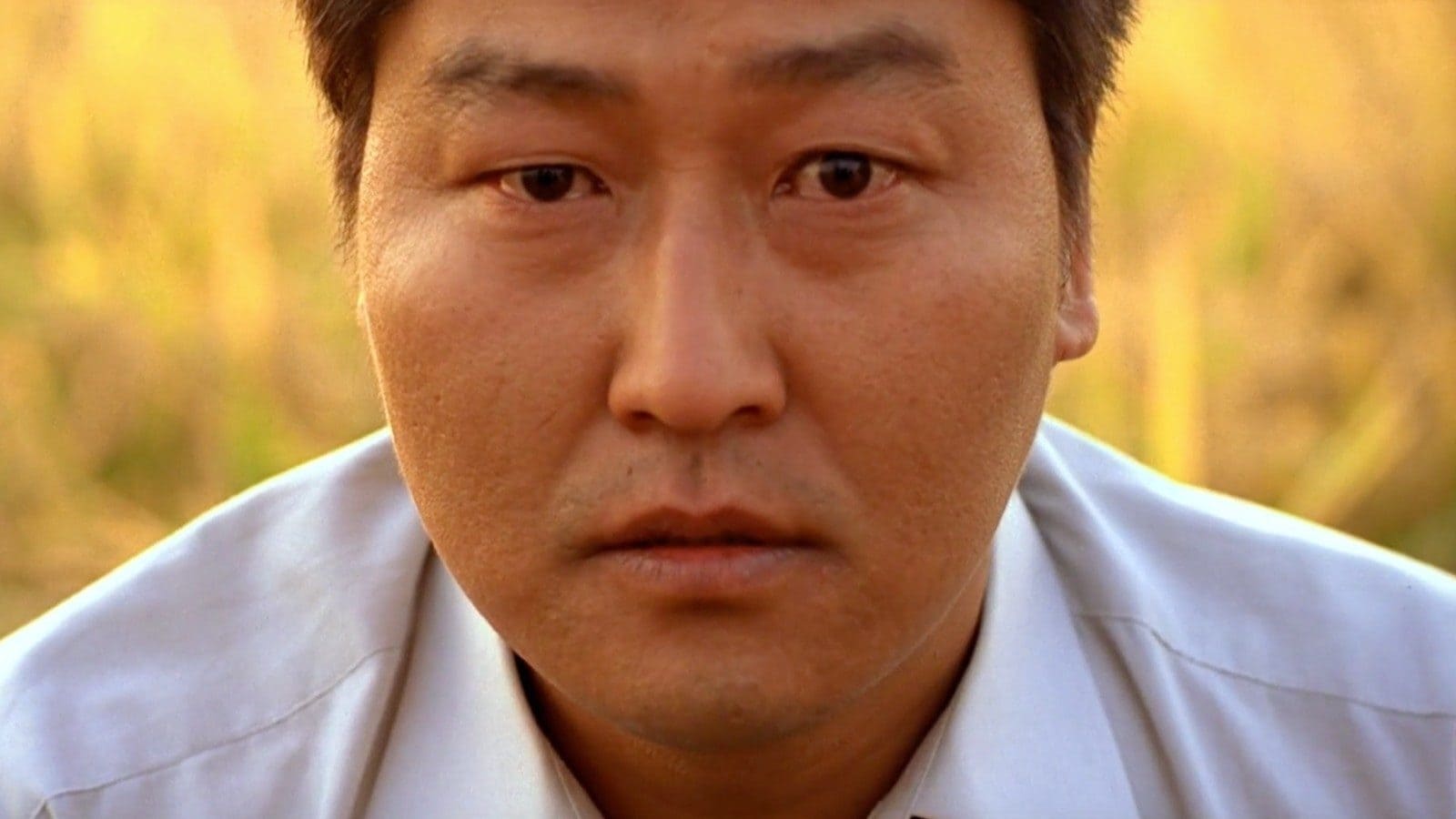
Bong Joon-ho proves that he has learned the correct definition of Suspense in cinema. When we are informed in the very beginning that the murderer has not been found in reality, we can predict that the movie is not supposed to end with the finding of the murderer. But those of you friends who have studied the concept of Suspense in cinema would know that suspense is not always about “what would happen”. Rather, it’s commonly about “how the event in question is supposed to happen” and this ingenious director has managed to refine this important concept.

Always pay attention to the opening scenes of a movie. Great directors tend to reveal important codes to their audience from the very beginning. In the first scene, when we see a child is imitating Detective Park, Bong Joon-ho is putting our minds to rest … yes, even that child knows that it’s out of these people’s hands and is ridiculing them. (There exists a connection between the opening and ending scenes of the movie that I’ll be addressing at the end.)

If we were to look at this work philosophically, we would find out that the characters of the movie can be any one of us. Completely ordinary people that seem to have just kicked off their first case in their new job as officers of the law and now have enthusiasm for finding the truth, so they are constantly making mistakes and putting themselves in trouble and certainly such individuals will reach a dead end.
One of the reasons that Bong Joon-ho is interested in such stories is their insolvability. Essentially, a philosophical despair can be felt in his works and thus, it is no surprise that he gives the green light to stories of this kind.

The main detective of the story, Mr. Park, and his partner, Cho −whom we find out from the beginning that there isn’t much to be hoped from− compel us to feel the absence of a responsible and trust-worthy detective because just like the characters of the movie, we also want justice to be served. The point is that when the experienced and reliable detective Seo is added to the movie, we are initially assured but it seems like we were mistaken. It seems like Bong Joon-ho had already made it clear for us from the opening scene that the murderer is not supposed to be found and so he is going to start a different game with us and tell us something else.

Aside from its genre and recurring yet popular plot, the movie ‘Memories of Murder’ touches on extremely important and thought-provoking points in its core. For instance, have you noticed that the main characters of the story undergo major changes in their views over the course of the movie?! Like Cho with his aggressive behavior who we used to see his boots on the suspects’ faces all the time seems to realize after his leg was amputated that despite all the chaos in the world, it still has some rules as well and although he covered his boots with a napkin so as to not leave its trace on the face of individuals, destiny will still take not only his boots but his leg from him too. A shot in which the camera masterfully stops on boots covered with napkin is a testament to this matter.

And most important of all is the changes in the characters of Park and Seo. Have you noticed that their morality and temperament completely swap at the end of the movie?! Detective Park who had no qualm about charging an innocent person just to solve the problem and gain respect and reputation was the only one at the end of the movie who prevented a grave mistake by Detective Seo. Or Detective Seo who came to reform the enforcement of law and administer justice in humane ways is pushed over the edge by his and his colleague’s helplessness and decides to administer justice in an illogical manner just like Park used to do before.

But what is the movie trying to conclude from the aforementioned points? The point that we will be learning is that on their way to do their duty, sometimes humans find themselves doomed to reach a conclusion. In simpler words, a man who sacrifices his duty to reach a conclusion, not only forgets his duty but also puts himself and the result of his work in a vortex of ruin and doom. A process that we clearly see in the fate of these three individuals. Humans that have forgotten humanity and morality just to reach a conclusion.

Although they have not reached a conclusion, but on their way to find an answer, they have trampled many rights and these trampled rights make them not officers of the law, but rather a person just like the same murderer. Now we understand the meaning of Detective Park’s look toward the camera. He is staring at the camera and telling the audience with his eyes that “a murderer is not born a murderer, rather he merely loses his path, just like how we lost the path of enforcing the law and maybe we are not so different with that murderer now” … yes, according to that little girl, he had an ordinary look, just like me and you do.

In this section, I’m about to look at an interpretation of the opening scene of the movie and its connection with the ending shot. Before addressing the opening scene, let us close the case of the ending shot. The meaningful gaze of Detective Park toward the camera has a double-sided allusion.
The first impression formed within the narrative is that Detective Park is alluding to every human.
The second impression is meta-narrative (i.e., outside the narrative). According to the director himself, Detective Park’s gaze is toward the real murderer (in the real world). (That is to say the filmmaker wanted to attract the attention of the real murderer who may have seen the movie toward Detective Park’s gaze.)

But that is not all! … In the beginning of the movie in the very first shot, we see a boy that captures a grasshopper with his hand. This does not draw the attention of the audience at the first glance, but when we find out that this boy keeps more than one grasshopper (actually maybe 50) in a closed plastic container (which the camera stops on it for a second) the attentive audience would notice that a message is about to be conveyed.
This viewpoint that every human is in some way guilty has been clearly show to us by Bong Joon-ho in the movie ‘Parasite’ as well.
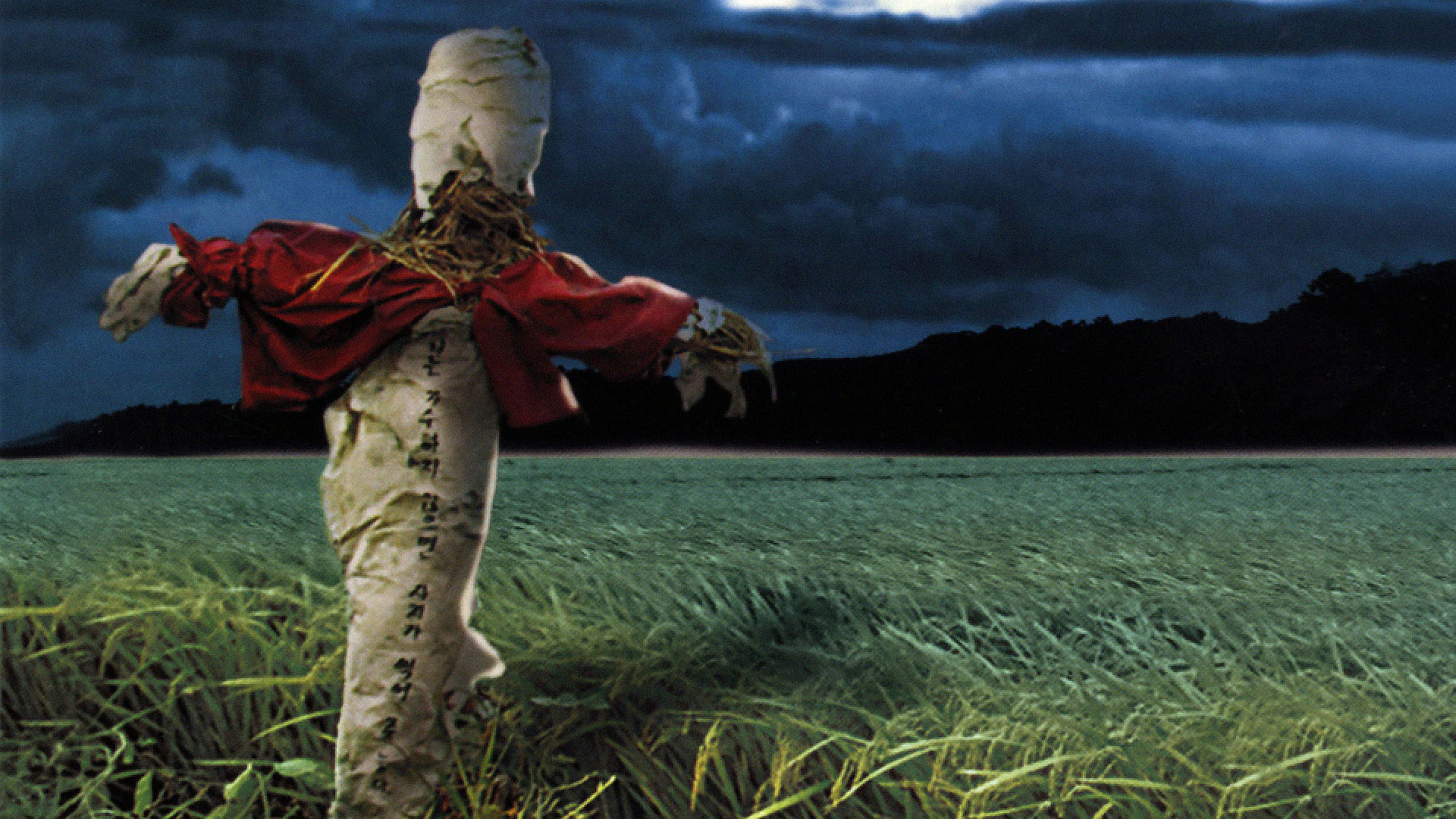
When the boy hides the container full of live grasshoppers behind himself (which means that he knows he is doing something wrong) Bong Joon-ho’s philosophy is showing itself off again. A mindset that can be clearly seen in the ‘Parasite’ too.
Or for instance, Detective Park and his assistance themselves who are willing to charge an innocent person just to close their case, or even Detective Seo who was once the only character in the movie with totally positive traits becomes guilty at the end too.
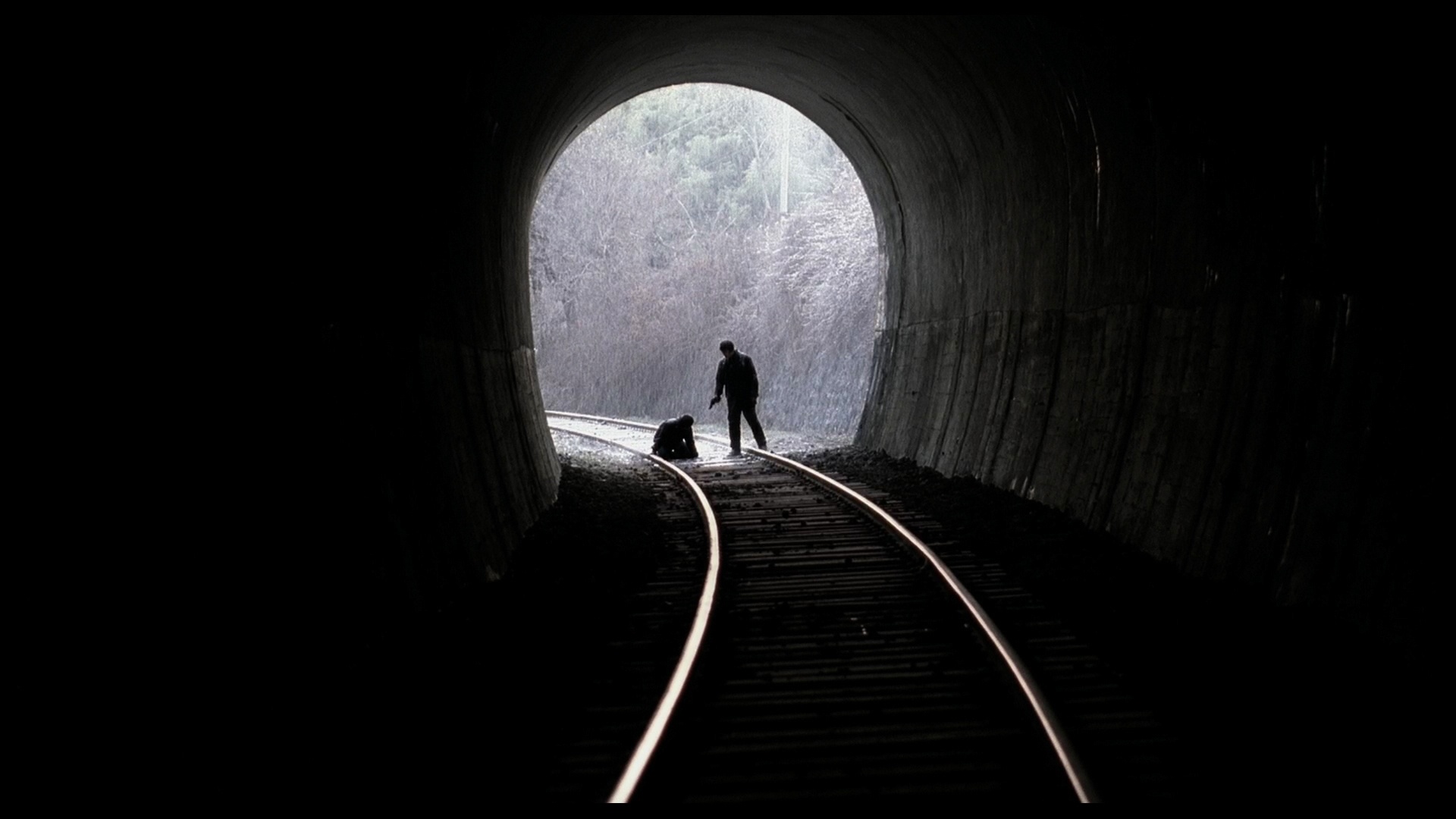
Yes, this is the world of Bong Joon-ho in the movie ‘Memories of Murder’. A world where everyone is in some way guilty but their guilts take different forms. A child that imprisons live grasshoppers, detectives that have their actions and behaviors based on injustice, and a murderer that murders its victims.
Detective Park looks at the camera as if he’s asking us “what’s your sin?”.
In Memories of Murder who was the killer? Who did it?
On September 18, 2019, more than 13 years after the deaths, authorities revealed that Lee Choon-jae, a man in his 50s, had been named as a suspect in the slayings. Following a DNA match between his and the underpants of one victim, he was recognised, and further testing connected him to four further unsolved serial killings.
Memories of Murder ending explained:
Seo exclaims that Hyeon-gyu is the murderer and that the documents are false. Park approaches the suspect with his eye contact technique but learns that, unlike before, he cannot make any inferences. Park intervenes to stop Seo from shooting the culprit and lets Hyeon-gyu go. The crimes are ultimately unsolved.
Is Memories of Murder a true story? What was it based on?
Bong Joon-ho co-wrote and directed the 2003 South Korean crime thriller movie Memories of Murder. It is largely inspired on the true account of the first proven serial killings in Korea, which occurred in Hwaseong, Gyeonggi Province, between 1986 and 1991.
Did they find the killer in Memories of Murder?
Yes, even though the killer was still at large when Bong Joon-ho wrapped up the Memories of Murder movie.
When does it take place?
The Hollywood Reporter states that the murders in Memories of Murder occurred in Hwaseong, a city in Gyeonggi Province south of Seoul, between 1986 and 1991. The serial murderer claimed ten female victims, ranging in age from teenagers to a woman in her 70s.
How accurate is its story?
It is largely inspired on the true account of the first proven serial killings in Korea, which occurred in Hwaseong, Gyeonggi Province, between 1986 and 1991. Detective Park and Detective Seo, two of the investigators attempting to investigate the crimes, are portrayed by Song Kang-ho and Kim Sang-kyung, respectively.
Is Memories of Murder in Korean?
Yes. Bong Joon-ho co-wrote and directed the 2003 South Korean crime thriller movie Memories of Murder.


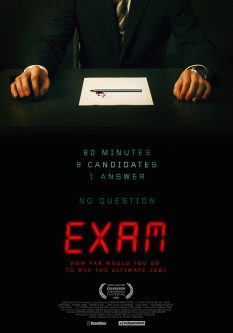
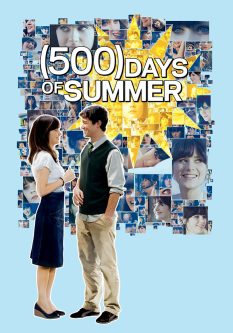
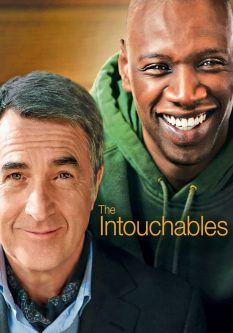
When we Look at the director’s previous works, we realize that his success in this film is not only accidental, but also he is very good at making such masterpieces. Such as the great movies like Mother, Snowpiercer and The Host, which is a horror-monster movie. Therefore, compared to the famous works of this genre in Hollywood, Memories of Murder has been disliked by the audience.
One of the top criminal thrillers is Memories of Murder. Because of how interesting and well-written the plot is, you’ll be hooked and enthralled the entire time.
It may begin by seeming a little slow-paced at first, but as the tempo builds up, the intensity increases. It is unquestionably worthwhile to watch this movie because it will linger with viewers and they won’t quickly forget it.
One of the best serial killing documentaries ever done. Memories of Murder focuses more on the psychological issues of those involved in the case than it does on the actual murders. The genius of Bong Joon-Ho is in turning a brutal subject into such a compassionate film. Your eyes will start to cry up at the conclusion. I’m in love with this director; Parasite can’t even come close to this one. Excellent!